Related Research Articles

Albert of Brandenburg was a German cardinal, elector, Archbishop of Mainz from 1514 to 1545, and Archbishop of Magdeburg from 1513 to 1545.

The Church of England is the established Christian church in England and the Crown Dependencies. It is the origin of the Anglican tradition, with foundational doctrines being contained in the Thirty-nine Articles and The Books of Homilies. Its adherents are called Anglicans.

Desiderius Erasmus Roterodamus, commonly known in English as Erasmus of Rotterdam or simply Erasmus, was a Dutch Christian humanist, Catholic priest and theologian, educationalist, satirist, and philosopher. Through his vast number of translations, books, essays, prayers and letters, he is considered one of the most influential thinkers of the Northern Renaissance and one of the major figures of Dutch and Western culture.
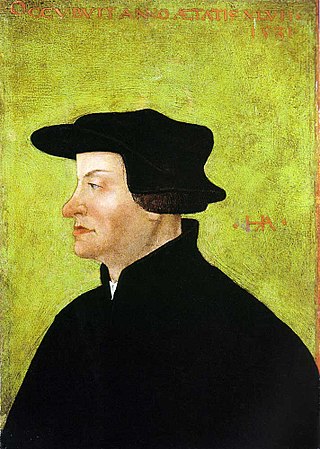
Huldrych or Ulrich Zwingli was a Swiss Christian theologian, musician, and leader of the Reformation in Switzerland. Born during a time of emerging Swiss patriotism and increasing criticism of the Swiss mercenary system, he attended the University of Vienna and the University of Basel, a scholarly center of Renaissance humanism. He continued his studies while he served as a pastor in Glarus and later in Einsiedeln, where he was influenced by the writings of Erasmus.
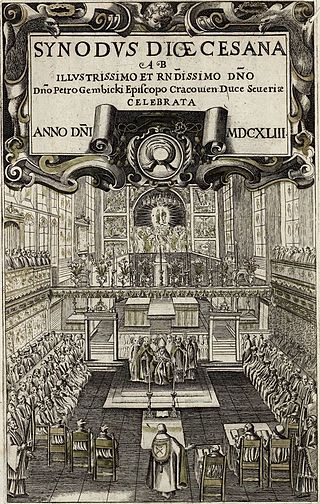
A synod is a council of a Christian denomination, usually convened to decide an issue of doctrine, administration or application. The word synod comes from the Ancient Greek σύνοδος 'assembly, meeting'; the term is analogous with the Latin word concilium'council'. Originally, synods were meetings of bishops, and the word is still used in that sense in Catholicism, Oriental Orthodoxy and Eastern Orthodoxy. In modern usage, the word often refers to the governing body of a particular church, whether its members are meeting or not. It is also sometimes used to refer to a church that is governed by a synod.

Johannes Oecolampadius was a German Protestant reformer in the Calvinist tradition from the Electoral Palatinate. He was the leader of the Protestant faction in the Baden Disputation of 1526, and he was one of the founders of Protestant theology, engaging in disputes with Erasmus, Huldrych Zwingli, Martin Luther and Martin Bucer. Calvin adopted his view on the Eucharist dispute.

Wolfgang Fabricius Capito was a German Protestant reformer in the Calvinist tradition.

Ulrich von Hutten was a German knight, scholar, poet and satirist, who later became a follower of Martin Luther and a Protestant reformer.
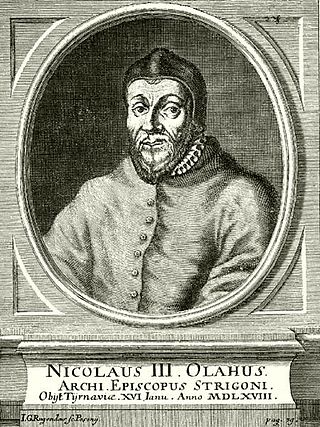
Nicolaus Olahus ; 10 January 1493 – 15 January 1568) was the Archbishop of Esztergom, Primate of Hungary, and a distinguished Catholic prelate, humanist and historiographer.

Julius von Pflug was the last Catholic bishop of the Diocese of Naumburg from 1542 until his death. He was one of the most significant reformers involved with the Protestant Reformation.
Renaissance humanism came much later to Germany and Northern Europe in general than to Italy, and when it did, it encountered some resistance from the scholastic theology which reigned at the universities. Humanism may be dated from the invention of the printing press about 1450. Its flourishing period began at the close of the 15th century and lasted only until about 1520, when it was absorbed by the more popular and powerful religious movement, the Reformation, as Italian humanism was superseded by the papal counter-Reformation.

Basel was a canton of Switzerland that was in existence between 1501 and 1833, when it was split into the two half-cantons of Basel-City and Basel-Country.
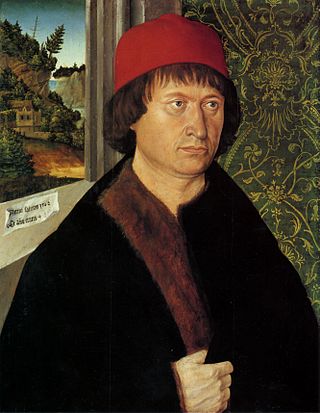
Hugo von Hohenlandenberg was Bishop of Konstanz from 1496 to 1529, and again in 1530 and 1531 until his death in 1532.

The Prince-Bishopric of Basel was an ecclesiastical principality within the Holy Roman Empire, ruled from 1032 by prince-bishops with their seat at Basel, and from 1528 until 1792 at Porrentruy, and thereafter at Schliengen. As an imperial estate, the prince-bishop had a seat and voting rights at the Imperial Diet. The final dissolution of the state occurred in 1803 as part of the German Mediatisation.

The Prince-Bishopric of Augsburg was one of the prince-bishoprics of the Holy Roman Empire, and belonged to the Swabian Circle. It should not be confused with the larger diocese of Augsburg, over which the prince-bishop exercised only spiritual authority.

Jakob Christoph Blarer von Wartensee was a Bishop of Basel and a leader in the Counter-Reformation in the region around Basel, in Switzerland.

Duke Ernest of Bavaria was the Administrator of the dioceses of Passau and Salzburg and pledge lord of Glatz.
Philippe von Gundelsheim (1487–1553) was the Prince-Bishop of Basel from 1527 to 1553.
Ulrich Hugwald was a Swiss humanist scholar and Reformer.
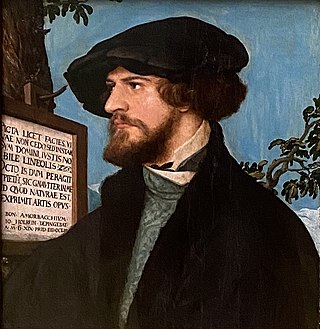
Bonifacius Amerbach was a jurist, scholar, an influential humanist and the rector of the University of Basel for several terms.
References
- 1 2 Erasmus, Desiderius (1 November 1989). The Correspondence of Erasmus: Letters 1252 to 1355. University of Toronto Press. p. 227. ISBN 978-0-8020-2604-0.